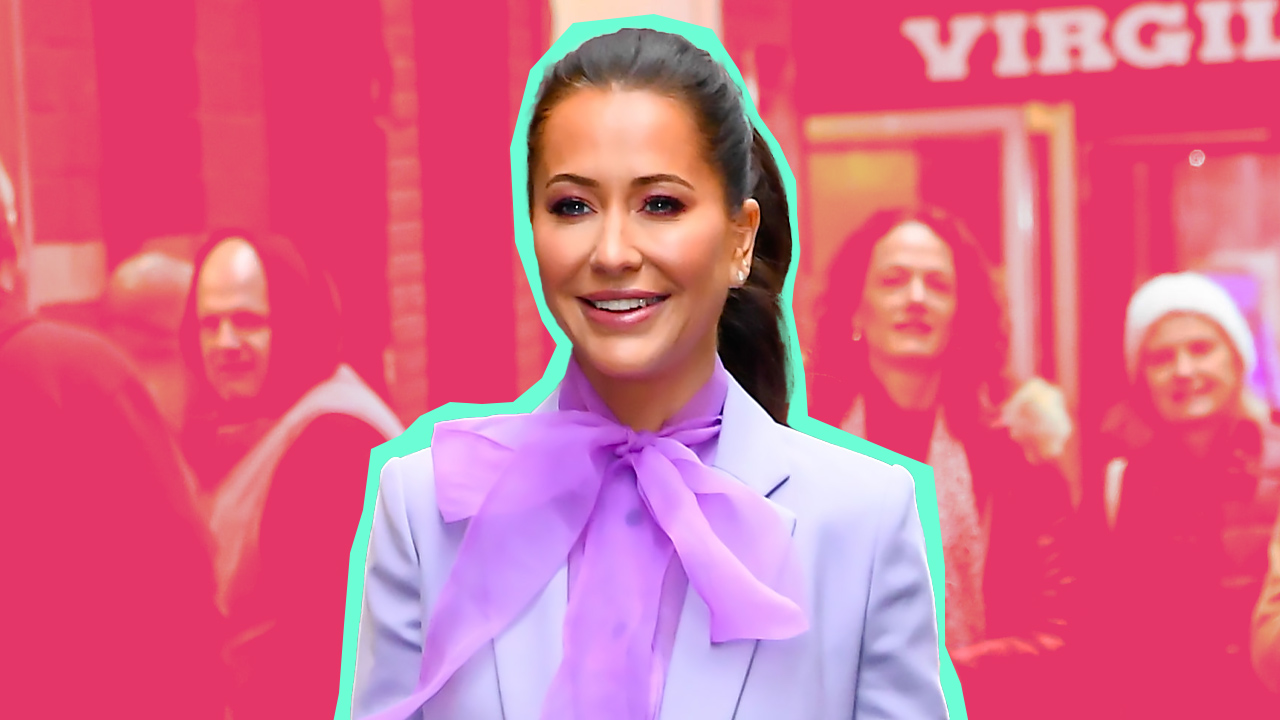Jessica Mulroney’s Comeback Might Be the Latest Example That Cancel Culture Doesn’t Work
By the looks of it, little has changed
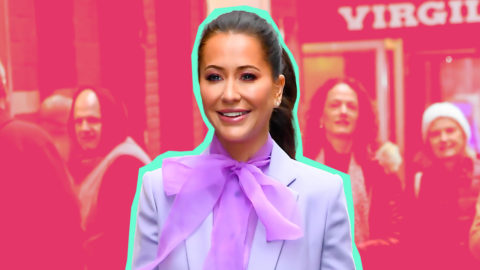
Two months after taking a social media hiatus following being called out for her “textbook white privilege” by Canadian lifestyle blogger Sasha Exeter, Jessica Mulroney has returned to Instagram.
Back in June, Mulroney received backlash for what Exeter—a single Black mother—described as problematic and threatening behaviour, amid the Black Lives Matter movement and multiple anti-Black racism protests around the world. Mulroney, a Canadian stylist, TV personality and (former?) close friend of Meghan Markle, made her official return to the platform on August 11, posting a video of her family celebrating her twin sons’ 10th birthday. (Note: In July, she momentarily returned to Insta, posting a screenshot of a T-shirt featuring Exeter’s face on her Stories, before promptly deleting it.)
“Happy 10th to my twin babies. My incredible family has had to witness their mom in the worst state. These two boys have not left my side and gave me the will to live and work hard when everything fell apart. They deserve the best birthday. Only up from here,” she captioned the post.
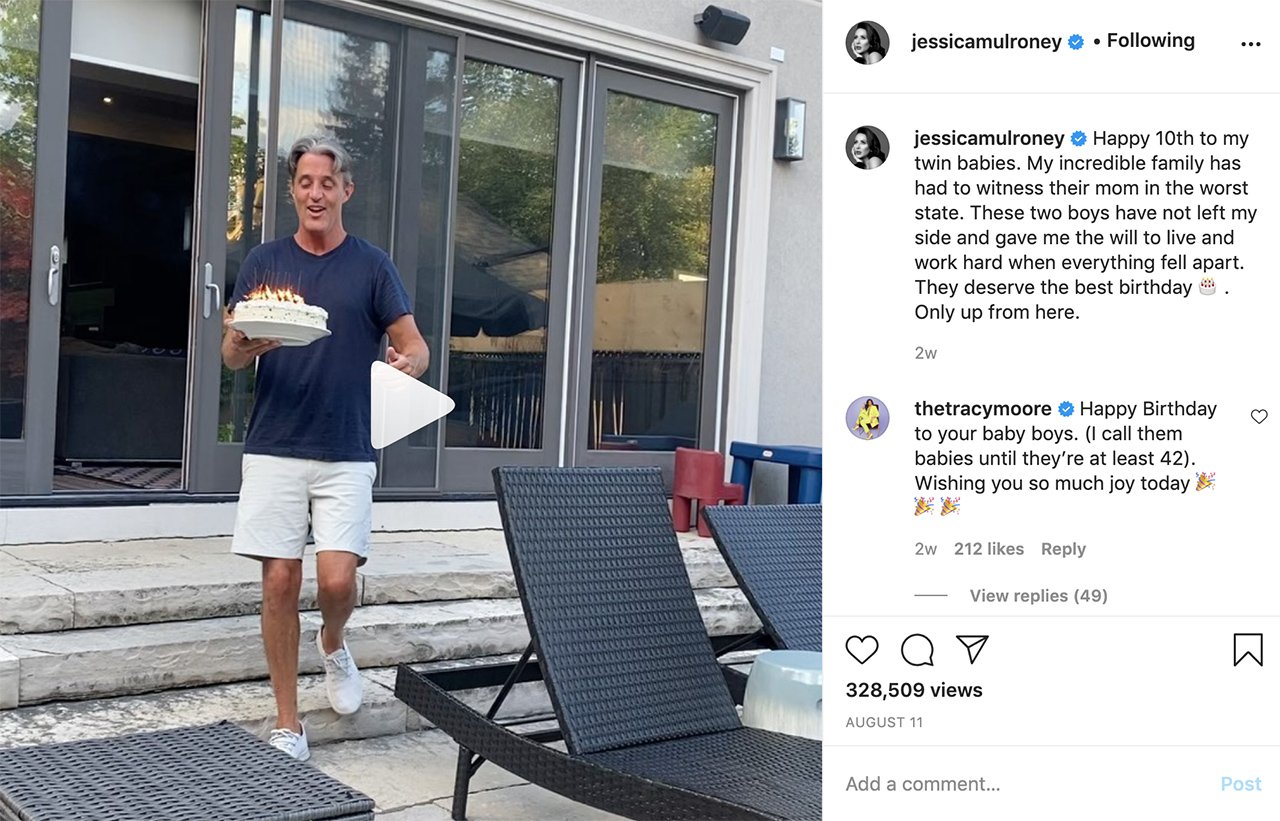
A few days later, Mulroney posted a photo of her daughter, Ivy, posing poolside, captioning the photo “My [unicorn],” and on August 17, she posted an image of a quote card that says, “A quiet woman is at peace & about to change everything.”
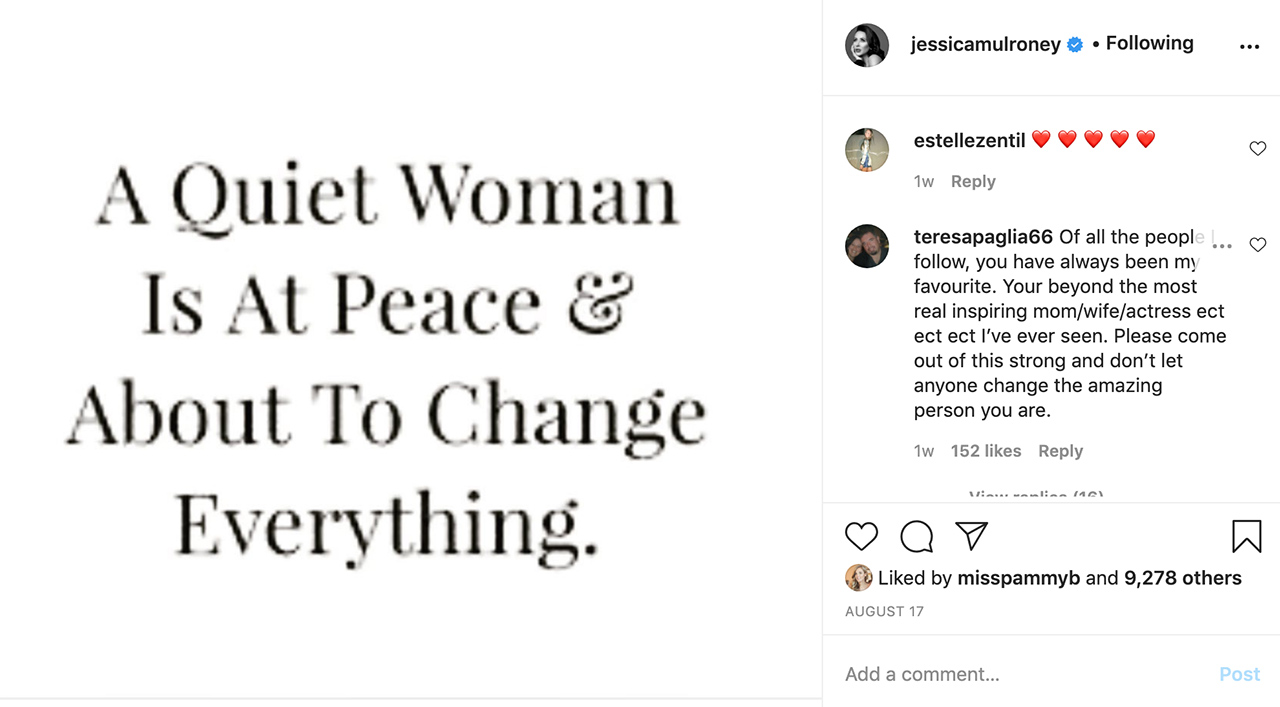
Despite Mulroney’s “fall from grace” which resulted in the loss of her TV gigs with ABC and CTV and partnerships with brands like Smash + Tess and Hudson’s Bay, it seems like she hasn’t lost support among many of her fans, including some of the most influential ones. Her recent posts appear to be generally well-received, with Jessica’s followers, including celebs like Mindy Kaling (whom Mulroney has styled in the past), praising her return and offering support. And although she may no longer be hosting I Do, Redo, she is making it known (via her Instagram Stories), that she is “grateful” to still be “creating beautiful weddings for deserving brides.” By the looks of it, Jessica Mulroney is far from “cancelled.”
For some, this isn’t entirely surprising. At the height of the controversy surrounding Mulroney and Exeter, Refinery29 writer Kathleen Newman-Bremang said she was “skeptical…that these consequences will stick.” Likewise, Lainey Lui of LaineyGossip, who worked with Mulroney’s husband Ben at Etalk (where he recently stepped down as anchor), suggested Mulroney’s comeback would take three to six months, “when Jessica’s white privilege (which is already working in her favour, since as small as the Toronto arts and media circle is, it’s also homogeneous, and many of the people who work at the media, marketing, and branding agencies are also largely white so they identify and sympathize with her) is reactivated.”
It seems that it may have only taken two months for said “reactivation” to occur. And it’s a case study in just how pointless “cancel culture” really is.
As quick as we are to “cancel,” we forget about “cancellations” even quicker
Cancel culture goes a little something like this: Celebrity or influential person does or says something “wrong.” Social media (and increasingly traditional media) are quick to call out said celebrity for their wrongdoings, which often results in some sort of reckoning via a hashtag on Twitter (e.g. #CelebNameIsOverParty), a bunch of thinkpieces on the controversy, and some sort of apology-adjacent statement from the “cancelled” celebrity. The celeb lays low for a period, and by the time they return to the spotlight their wrongdoings have mostly been forgotten—since several other cycles of “cancelling” have occurred in the meantime, diverting our collective attention.
As Vox notes, very few cancelled celebrities actually suffer long term career setbacks—just look at Logan Paul and James Charles, two famous YouTubers who have been cancelled numerous times and still have successful careers. Or Dolce & Gabbana, a fashion brand that, despite its controversial history of being racially insensitive and straight-up racist, is still being worn by celebrities on red carpets. The exceptions to the rule would be individuals like Harvey Weinstein and Bill Cosby—celebrities that have been actually charged with rape and sexual assault. For the most part, thanks to abundant financial resources and good crisis PR teams, celebrities more often than not return to the spotlight, seemingly unscathed aside from embarrassment and a few project losses that do not necessarily impact their overall careers.
“Americans, and particularly celebrity-watchers, have a short attention span for scandal if they like you. As long as you’re doing better, and keeping me happy, and keeping me entertained, I’ll forgive you,” HeraldPR President Juda Engelmayer told Vice, while referring to Ellen DeGeneres, who is currently facing her own scandal thanks to allegations of a toxic work environment on the set of her talk show, and the firing of the show’s top three producers following allegations of sexual misconduct.
Still, celebs seem obsessed with calling for “freedom of speech”…
Despite the lack of evidence that getting “cancelled” has any long term consequences, celebs still act threatened by it and have increasingly been calling for “freedom of speech.” In the most recent instance, comedian Ricky Gervais told Metro that people who challenge others for saying things they don’t agree with “don’t agree with freedom of speech.”
“If it is choosing not to watch a comedian because you don’t like them, that’s everyone’s right. But when people are trying to get someone fired because they don’t like their opinion about something that’s nothing to do with their job, that’s what I call cancel culture and that’s not cool,” the 59-year-old creator of The Office told the publication. His remarks bring up an important question: When is something considered a harmless “opinion” and when does it affect other human beings’ respect and livelihood? For example, in the Canadian Charter of Rights and Freedoms (where freedom of speech is referred to as freedom of expression) there is a clause about “reasonable limits” including hate speech. This distinction is something that tends to be overlooked in these celebrity arguments for free speech.
Take for example the infamous Harper‘s letter that came out in July, in which over 150 academics, writers and authors (including J.K. Rowling, Noam Chomsky and Margaret Atwood) condemned cancel culture on the basis that it threatens the right to free speech, “the lifeblood of a liberal society,” and argued that it promotes an “intolerance of opposing views [and] a vogue for public shaming and ostracism.”
"As writers we need a culture that leaves us room for experimentation, risk taking, and even mistakes. We need to preserve the possibility of good-faith disagreement without dire professional consequences."https://t.co/4zPjuPNXBu
— Harper's Magazine (@Harpers) July 8, 2020
As journalist and author Owen Jones wrote on Twitter, “All too often, ‘cancel culture’ becomes a means for very rich and very powerful people to pretend they are victims when people respond to very controversial things they have used their huge public platform to say.” And, TBH, if you’re going to make controversial comments—like implying trans women aren’t women, like J.K. Rowling did—backlash shouldn’t be surprising.
What people like Gervais and the Harper’s letter petitioners seem to be fighting for is not necessarily a right to free speech, but the right to use free speech—even if it’s hate speech—on specific platforms without the fear of social backlash.
…and being granted forgiveness without doing the work
In an interview with O, The Oprah Magazine in May, actor Kevin Hart, who has faced backlash for a number of his own scandals, including dozens of homophobic tweets, in the past, described what he considers the negative impact of cancel culture and shunning celebrities after they’ve made mistakes.
“Nobody’s perfect, nobody’s going to be,” the 40-year-old Jumanji star said during the Instagram Live interview. “We’re living in a time where we’re just expecting perfect, as if people don’t slip and fall down the steps, or everybody walks straight all the time. But you stumble…it’s weird to really hold people at a level that they never asked to be held at.
“We can’t be so persistent with the search to find and destroy. Although some things are warranted and I understand, it’s just us as people have got to be smart enough to go, ‘You know what, whatever has happened, has happened,’ but people deserve a chance to move on,” he continued.
Everyone absolutely deserves a chance to do better and ultimately be forgiven. But they also need to earn it. Following his Oscars hosting controversy, Hart said he was making sure he was “doing everything to show that I’m aware of my mistakes and moving forward.” This came in the form of a written apology, an interview on Ellen and a Netflix docuseries, Don’t F*** This Up. But critics felt these measures were insincere and that he refused to truly own his mistakes.
Demi Lovato has also spoken out on the cancellation of celebrities, calling for “forgiveness culture” instead.
“Where is the forgiveness culture?” she asked on an episode of Jameela Jamil’s I Weigh podcast. “If you have used up your second and third chances with a certain topic, you’re cancelled and you should stay cancelled, but if you mess up and you apologize and you come forward and you say, ‘I’ve learned from this,’ then let that be an example for other people so that they can change too.”
So, what does that look like? There are a handful of celebs who seem to be genuinely making the effort to get it right. Take the recent example Ryan Reynolds and Blake Lively. The couple made a public apology in August for having hosted their 2012 wedding at the site of a former plantation in South Carolina. Their move was criticized at the time, but the couple came under renewed scrutiny in 2018 after Reynolds tweeted in support of Black Panther, the first superhero movie to feature a majority Black cast, and was accused of hypocrisy.
“It’s something we’ll always be deeply and unreservedly sorry for,” the Deadpool actor told FastCompany in a recent profile. “It’s impossible to reconcile. What we saw at the time was a wedding venue on Pinterest. What we saw after was a place built upon devastating tragedy.”
“Years ago we got married again at home—but shame works in weird ways,” he continued. “A giant fucking mistake like that can either cause you to shut down or it can reframe things and move you into action. It doesn’t mean you won’t fuck up again. But repatterning and challenging lifelong social conditioning is a job that doesn’t end.”
Lively also made a public apology, taking to Instagram to reflect on systemic racism, white privilege and educating themselves and their children.
“We’re ashamed that in the past we’ve allowed ourselves to be uninformed about how deeply rooted systemic racism is,” the Gossip Girl alum said on the app, seemingly referring to the wedding site. “We look back and see so many mistakes which have led us to deeply examine who we are and who we want to become. They’ve led us to huge avenues of education.”
https://www.instagram.com/p/CA3523apMYB/?utm_source=ig_embed
Though their apologies didn’t satisfy everyone on Twitter, the couple did acknowledge their privilege, apologize profusely, describe what they had learned in the time that passed, and they appear to be trying to make amends in ways that directly affect the communities they offended: Along with donating $200,000 to the NAACP Legal Defense Fund, whose mission is to secure the political, educational, social and economic equality of rights in order to eliminate race-based discrimination, Reynolds also recently announced he was launching the Group Effort Initiative, a program focused on providing training to Black people and people from other underrepresented groups to support them as they pursue careers in the film industry. It may be too soon to tell if the couple will continue with their lifelong learning, but so far they seem to be taking it seriously and addressing it sensitively.
The problem is, privileged people aren’t often compelled to change their behaviour…
For the handful of celebs who apologize and make an effort to change their problematic behaviour after being called out, there are hundreds more who simply continue with their same offensive actions. Just think of how many times the Kardashian/Jenner clan has been “cancelled” for appropriating Black culture, yet still don’t modify their behaviour. They’re protected by their fame, connections and wealth, and they know it.
Which brings us back to Mulroney’s return to Instagram, which has many people speculating whether she has in fact changed. In her first public apology, posted as a comment on Exeter’s video soon after it was posted, she appeared to insinuate that her close friendship with Meghan Markle (who is Black) was “deeply educational” and she promised to “continue to learn and listen on how I can use my privilege to elevate and support black voices.” Then in a subsequent apology, which came after Exeter shared a screengrab of a private message from Mulroney threatening to sue her for libel, effectively calling her out her first apology as insincere, Mulroney stated she was “committed to using every platform and resource available to me to continue the important work of anti-racism.”
“The real work of bringing change goes beyond Instagram,” she wrote, adding “I hope you will all continue to hold me accountable.”
And in a third public apology, which came after CTV announced they would be removing her show I Do, Redo from their streaming platforms, the stylist said the events that transpired between her and Exeter “made it clear” that she had work to do.
“I realize more than ever how being a white, privileged woman has put me far ahead of so many, and in particular those in the Black community. And while I can’t change the past, I can do my part to do better in the future,” she wrote.
https://twitter.com/jessicamulroney/status/1271208870501900289
So, has she done that work in the months that have passed? That part is unclear. According to Mulroney’s more recent responses to commenters on her Instagram posts, she “has been putting in the work” behind the scenes. She also shared on her Instagram Stories that she recently finished a “project I’ve been working on for a month that will focus on helping marginalized communities across Canada,” and later asked her followers to DM her if they had old computers they no longer used, seemingly for that project. (So far, I have not been able to find any details on who these marginalized groups are, nor have I seen any public statements from Mulroney about specific anti-racism work she’s been doing since June.)
“I’m very much aware [of real life problems],” she replied to one Instagram user. “I’ve been working with marginalized communities for 12 years and have a new project. I’ve been putting in the work. Maybe I just don’t parade it on Instagram.”
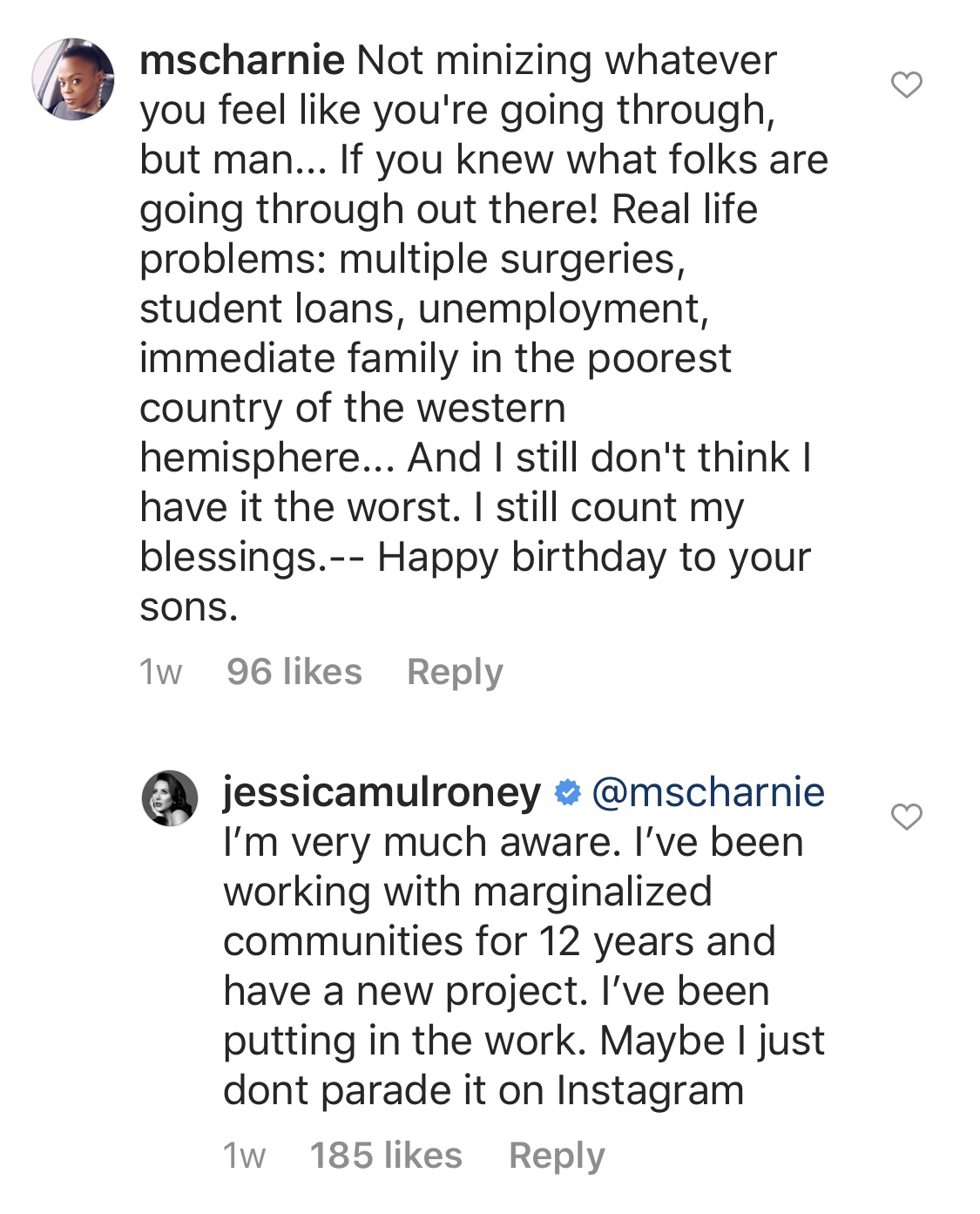
And that’s a fair point: Maybe we don’t need celebs to shout from the rooftops about the anti-racism work they are doing. (Though, I’d love to see it, TBH). What we do need is to see *some* signs of change and an active undoing of the mindset that led to the initial behaviour.
Unfortunately, many of Mulroney’s recent actions on social media suggest that she still has learning to do when it comes to her privilege. For example, shortly after the controversy with Exeter first came to light, Lui shared that Mulroney was allegedly telling those who continued to engage with her privately during her hiatus that “there are two sides to every story,” which, Lainey says, suggests “she doesn’t feel she’s as in the wrong as she actually is.” Seemingly supporting Lui’s theory, after Mulroney’s return to Instagram in August, she posted public replies to commenters, saying to “wait for the receipts before judging,” leading many to speculate that her apologies back in June were just lip service.
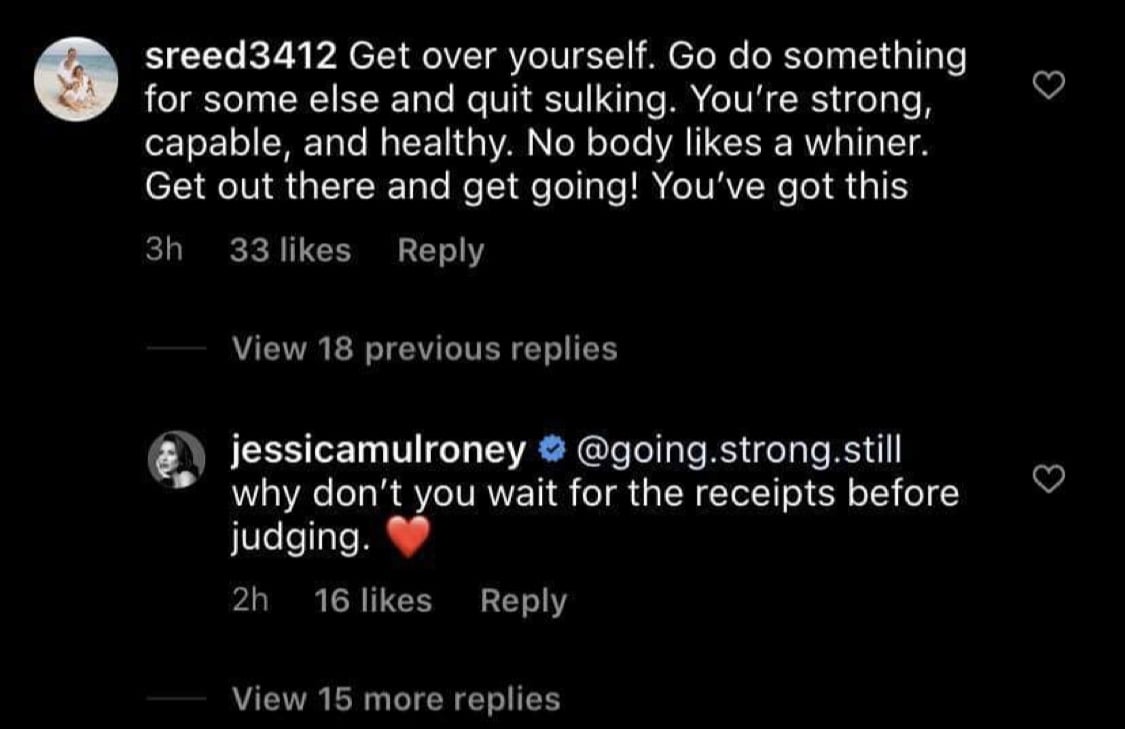
Then there’s the Instagram Story she posted on August 17: A car selfie with the caption, “Was so scared to leave my house. But he got me to do it for the first time in months.”
Meghan Markle's best friend Jessica Mulroney in cryptic Instagram post after 'falling out' https://t.co/QizxrRhihf pic.twitter.com/gSDQwym3Zb
— Daily Star (@dailystar) August 18, 2020
To be fair, Mulroney could very well have been referring to the coronavirus that has forced the world into lockdown for months but, as a friend of mine pointed out to me, there’s something ignorant about a privileged white woman claiming she is scared to leave the house while Black people are being murdered on the streets and even in their homes—especially when said white woman has been accused of anti-Black racism. And Mulroney may have received that feedback, because the Story was deleted shortly after it was posted.
…and that’s because we enable them
Full disclosure: I previously had a professional relationship with Mulroney when I was a fashion editor at a national magazine and she was styling Sophie Grégoire Trudeau (but before her association with Meghan Markle made her a household name). Following Grégoire Trudeau’s public appearances, Mulroney would often email me details of Sophie’s outfits, which I would then report on. Even back then, I was very aware of how intimidating the power and privilege of women like Mulroney—who not only has A-list celebrity connections but also prominent familial connections (her father-in-law, Brian Mulroney, is the former prime minister of Canada and her paternal grandfather was the founder Browns Shoes, one of Canada’s biggest footwear retailers)—can be. What I often witnessed in my line of work—not just in Mulroney’s case, but in many instances with similarly positioned individuals—is how that privilege is enabled, whether overtly through public support or more subtly, through the complicit actions of the people they surround themselves with, myself included. In my experience, well-connected people in positions of power whose behaviour is consistently enabled are less likely to be truly held accountable, and even less likely to hold themselves accountable.
Look at Kevin Hart again: With the unflinching support of Ellen DeGeneres (who was criticized at the time for trying to speak for all LGBTQ people by exonerating Hart), he felt emboldened to continuously push back against what he described as cancel culture, rather than genuinely respond to renewed calls for apologies with true contrition.
Lainey said it best back in June when looking critically at Mulroney’s apologies—and her backtracking on those apologies: “A series of changed actions can be the beginning of a changed person. Which is where Jessica Mulroney fell short, again. A few times.” Unfortunately, it appears that after her Instagram hiatus, Mulroney is still continuing to fall short by failing to demonstrate how she’s unlearning racism and dismantling her white privilege, and by seemingly undermining her original apologies by suggesting there are “receipts” that would ostensibly prove she wasn’t in fact in the wrong. This behaviour is indicative of one of the biggest issues surrounding cancel culture—with no follow-up on accountability, it simply doesn’t work.
Vice says the “fever dream of cancel culture is that it is some centralized infrastructure of accountability…But even holding a person accountable is dependent on a fixed hierarchy, a variety of measurable criteria: the prominence of the person, their popularity, their gender, the quality of their apology.” In short: We are dazzled by celebrity and power, and it prevents us from doing a decent job of holding celebs accountable after they’re so-called cancelled. We praise their bravery for returning to the public eye instead of demanding real answers about what they’ve done to change. In the case of Mulroney, this means not only hearing her apologies and learning about what charitable endeavour she’s working on to make amends but asking what actions she’s taking to dismantle her own white privilege and previous bullying behaviour.
If cancelling someone doesn’t work and we’re striving for accountability instead, we have to demand it. This means asking important questions, like what these “cancelled” individuals are doing to right their wrongs, looking at their actions with a thoughtfully critical lens and challenging any actions or statements that come from a victim or bullying mindset. We need to ensure we don’t simply take vague apologies and statements at face value, and that we don’t assume they have changed just because they say they have.
And we need to rethink how we support these individuals—whether through social media follows, likes, comments or purchasing or consuming their products. That’s not to say all of this should be done in a punitive or judgmental way—we need to remember, of course, celebs are humans too. But if we (respectfully) hold celebrities accountable after a “cancellation,” they will hopefully continue to keep themselves accountable far beyond their apologies and make-good projects.
Comments celebrating Mulroney’s return to Instagram (especially those from prominent figures) without questioning what she’s done to grow and change may lead her to believe that she is done doing the work—that her apologies and her new project are enough. But as we’ve learned over the past few months, dismantling white supremacy is a marathon, not a sprint. And right now, Jessica Mulroney has only maybe finished her first mile.
FLARE reached out to Jessica Mulroney and her PR team, and they declined to comment.


